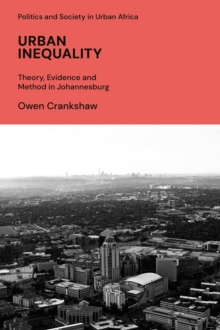Description
| Product ID: | 9781786998941 |
| Product Form: | Hardback |
| Country of Manufacture: | GB |
| Series: | Politics and Society in Urban Africa |
| Title: | Urban Inequality |
| Subtitle: | Theory, Evidence and Method in Johannesburg |
| Authors: | Author: Owen Crankshaw |
| Page Count: | 232 |
| Subjects: | Housing and homelessness, Housing & homelessness, Urban communities, Political oppression and persecution, Urban communities, Political oppression & persecution, Developing countries |
| Description: | An examination of howpatterns of income, class and racial inequality in Johannesburg highlight howand why earnings and spatial inequality in cities are changing in differingways to the, commonly-accepted, social polarisation hypothesis. Based on new evidence that challenges existing theories of urban inequality, Crankshaw argues that the changing pattern of earnings and occupational inequality in Johannesburg is better described by the professionalism of employment alongside high-levels of chronic unemployment.Central to this examination is that the social polarisation hypothesis, which is accepted by many, is simply wrong in the case of Johannesburg. Ultimately, Crankshaw posits that the post-Fordist, post-apartheid period is characterised by a completely new division of labour that has caused new forms of racial inequality. That racial inequality in the post-apartheid period is not the result of the persistence of apartheid-era causes, but is the result of new causes that have interacted with the historical effects of apartheid to produce new patterns of racial inequality. |
| Imprint Name: | Zed Books Ltd |
| Publisher Name: | Bloomsbury Publishing PLC |
| Country of Publication: | GB |
| Publishing Date: | 2022-02-24 |


